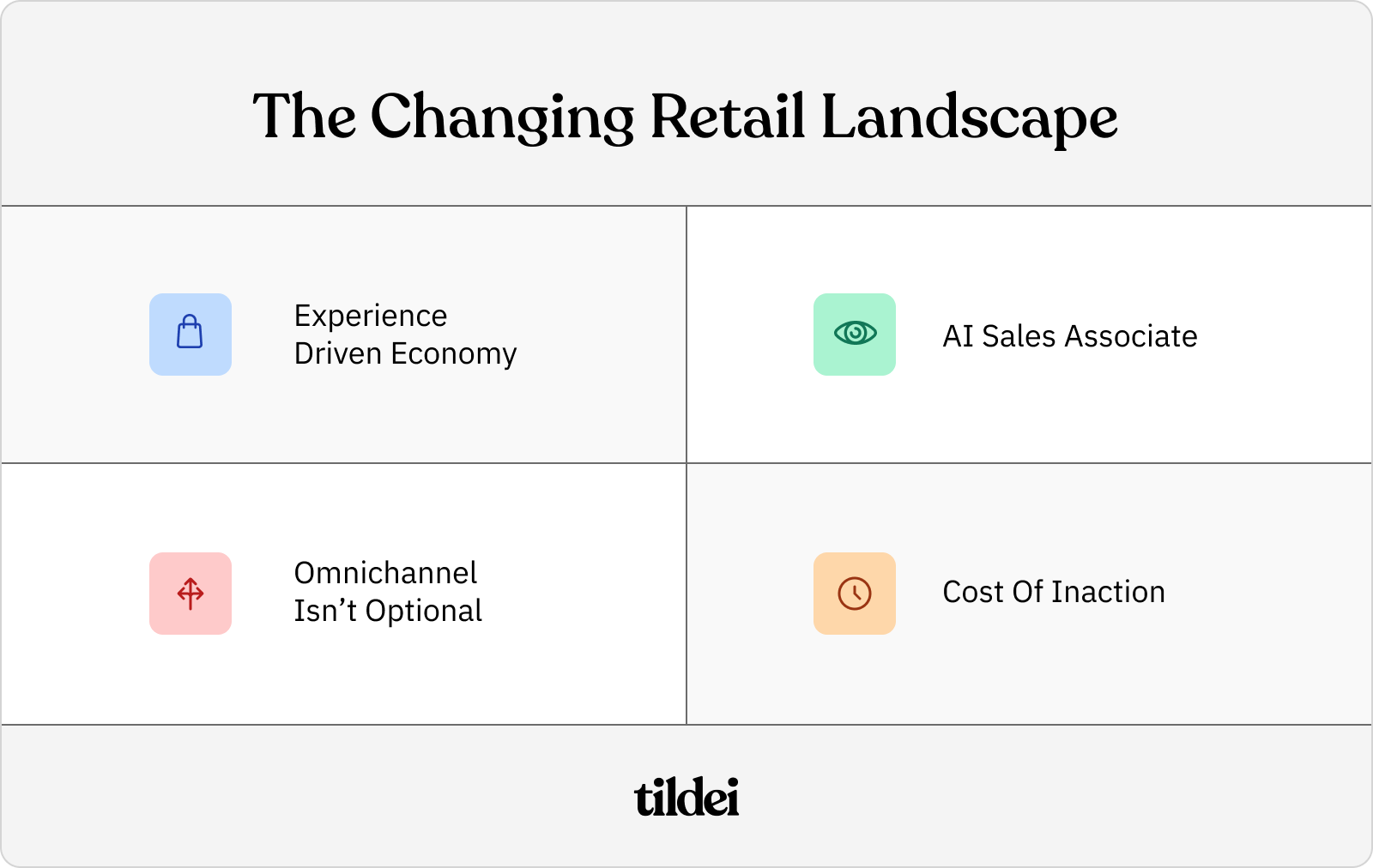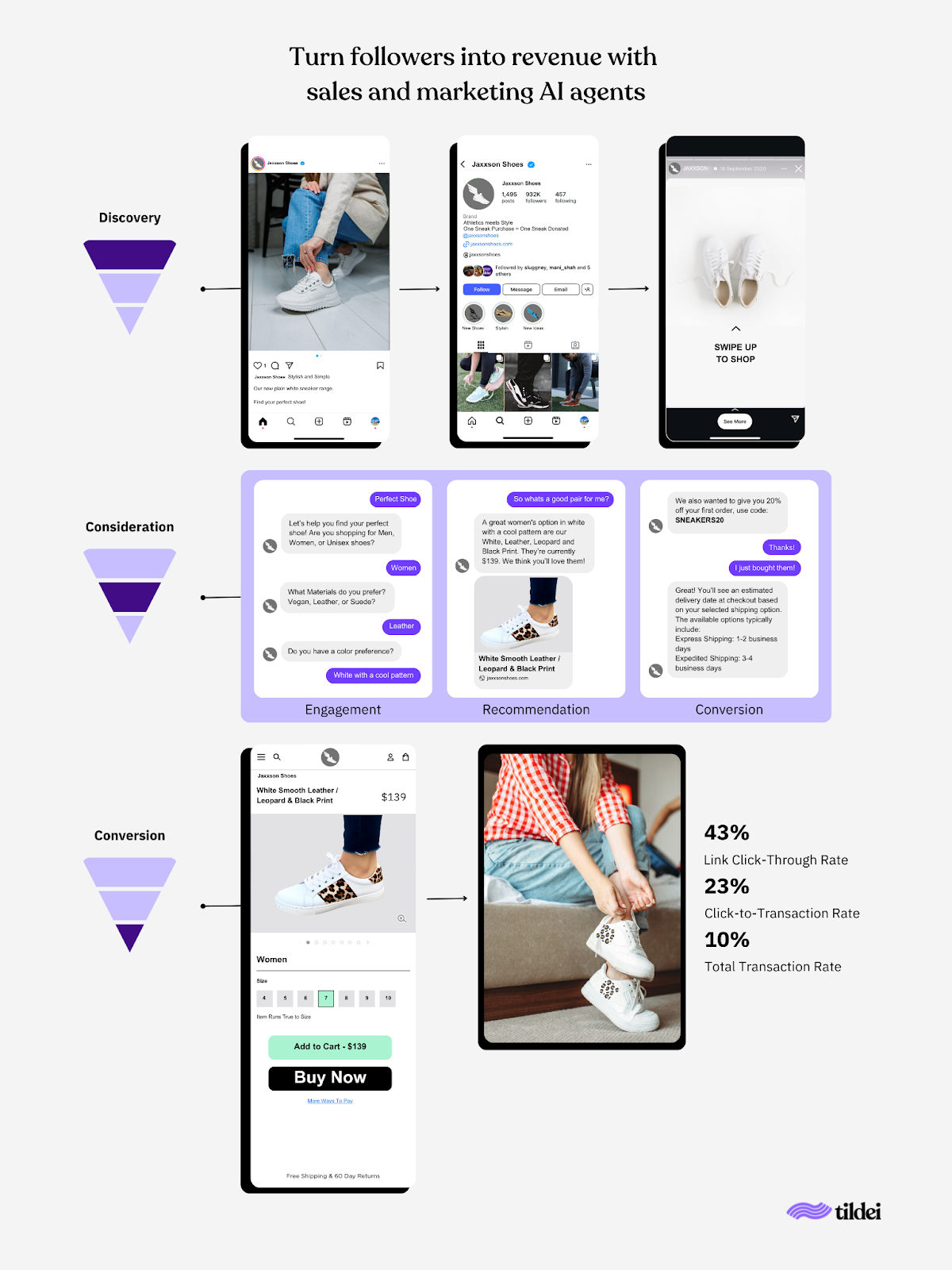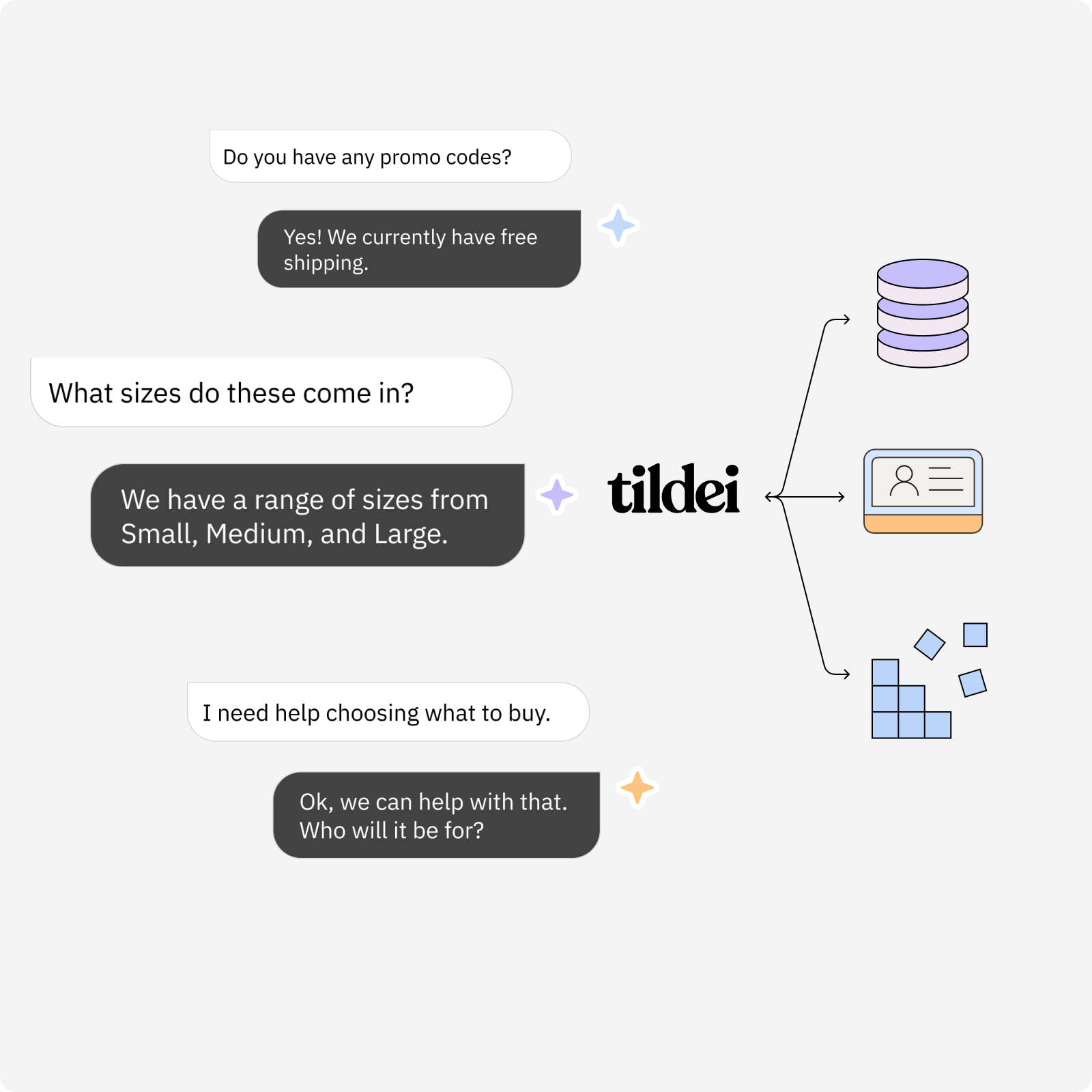Conversational Commerce for Brands: Why retail must evolve
Consumer expectations are shifting rapidly, and traditional e-commerce experiences are becoming more tailored and conversational. Adopting conversational commerce early presents a unique opportunity for brands to offer personalized, real-time engagement before it becomes the industry standard.
Retail is undergoing a transformation. Hyper-customized, AI-driven conversational shopping experiences have arrived. Brands are gaining a competitive edge as online shopping evolves. Consumer expectations are shifting rapidly, and traditional e-commerce experiences are becoming more tailored and conversational. Adopting conversational commerce early presents a unique opportunity for brands to offer personalized, real-time engagement before it becomes the industry standard.
The Retail Landscape Has Changed - Has Your Brand?

The Experience-Driven Economy
The modern customer doesn’t just want to purchase a product; they seek an immersive and personalized experience. From product discovery to post-purchase engagement, shoppers expect convenience, speed, and a sense of being understood by the brand. This shift is driving the need for AI-driven interactions that mimic human conversations and provide instant assistance.
AI as the New Sales Associate
Traditionally, in-store retail relied on sales associates to provide personalized recommendations and answer customer queries. Today, AI-powered conversational commerce for brands serves the same purpose, but across digital channels. AI agents provide tailored responses based on browsing history, past purchases, and customer intent.
Omnichannel is No Longer Optional
Customers want to engage with brands on multiple platforms - websites, mobile apps, social media, and messaging platforms like Instagram, Facebook Messenger, WhatsApp, and SMS. Retail brands that do not integrate conversational commerce across these channels risk losing engagement and loyalty.
The Cost of Inaction
Brands that don’t invest in conversational commerce face several challenges:
- High cart abandonment rates due to a lack of real-time support.
- Increased customer churn because of slow response times.
- Lost revenue opportunities from missed personalized upselling.
- Inefficient customer service operations that drive up costs.
Rethinking Customer Journeys: The Role of AI in Conversational Commerce
Moving Beyond Static E-Commerce
A static e-commerce website with product listings and a checkout process is no longer enough. Conversational commerce transforms this experience into a dynamic, interactive process where customers can ask questions, receive recommendations, and complete purchases without friction.

AI-Powered Discovery
AI-driven agents and virtual assistants act as digital shopping advisors, guiding customers toward the right products based on their preferences, past behaviors, and real-time needs. This personalized approach increases engagement and conversion rates.
Reducing Friction in the Purchase Process
Traditional e-commerce transactions require multiple steps, leading to abandoned carts. From enterprise to Shopify stores, conversational commerce is improving the customer experience. Using conversational commerce strategies streamlines the purchase process by allowing customers to:
- Make purchases directly from a chat recommendation.
- Receive instant answers to product-related questions.
- Receive prompt reminders about items left in their cart.
- Send discount codes within the customer shopping window to help complete a purchase.
Post-Purchase Engagement
The customer journey doesn’t end after a purchase. AI-driven conversational commerce ensures continued engagement through:
- Personalized follow-ups.
- Order tracking updates.
- Proactive recommendations for complementary products.
- AI-driven loyalty programs and exclusive offers.
The Blueprint: How Retail Brands Should Incorporate Conversational Commerce
Step 1: Define Your Conversational Strategy
Every brand has a unique customer journey. Before implementing conversational AI, brands should:
- Identify key pain points in the shopping experience.
- Determine where AI-driven conversations will add the most value.
- Consider moments in the shopper journey when a conversation could be helpful I.e. a product page, in Instagram, via WhatsApp.
- Set clear objectives, whether it’s increasing conversions, enhancing customer service, or improving engagement.
Step 2: Choose the Right AI Technology
Selecting the right AI-driven solution is critical. Brands must consider:
Rule-based chatbots vs. AI-powered agents: Rule-based chatbots follow scripted responses, whereas AI-driven agents adapt to customer behavior and intent using machine learning and training on branded content.
Natural Language Processing (NLP) and Large Language Models (LLM): An effective AI assistant should understand and respond to customer inquiries in a natural, human-like manner.
Machine Learning Integration: AI agents must learn from interactions to continuously improve their recommendations and responses.
Step 3: Create a Seamless Omnichannel Experience
Customers interact with brands across various touchpoints. Retailers must ensure AI-powered conversational commerce is:
- Integrated across multiple platforms (website, mobile app, WhatsApp, Messenger, SMS, etc.).
- Consistent in messaging and responses across all channels.
- Capable of seamless handoff to human agents for complex queries.
Step 4: Optimize and Scale with Data
AI-powered conversational commerce provides valuable insights that brands can leverage to:
- Track customer preferences and behaviors.
- Refine responses for better engagement.
- Implement A/B/n testing to determine the most effective messaging strategies.

Overcoming Common Retail Challenges with AI-Powered Conversational Commerce
Cart Abandonment
One of the biggest pain points in e-commerce is abandoned carts. AI-powered agents can:
- Send personalized reminders.
- Offer limited-time discounts.
- Address customer concerns about pricing, shipping, or product details in real time.
Customer Support Bottlenecks
Many brands struggle with handling high volumes of customer inquiries. AI-powered agents:
- Reduce response times.
- Handle FAQs without human intervention.
- Escalate complex issues to human agents seamlessly.
Scaling Personalization
Providing 1:1 personalized experiences at scale is challenging without AI. Conversational commerce solutions:
- Deliver tailored recommendations based on browsing and purchase history.
- Adapt in real-time based on customer preferences.
- Engage users proactively with personalized promotions and restock alerts.
Increasing Repeat Purchases
AI-driven conversational commerce enables:
- Personalized product recommendations.
- Automated re-engagement campaigns for past customers.
- Loyalty program integration within chat interactions.

Future-Proofing Your Brand: What’s Next for Conversational Commerce?
AI-Powered Voice Shopping
Voice commerce is gaining traction, with smart assistants like Amazon Alexa and Google Assistant enabling customers to shop hands-free. Retail brands must explore integrating voice-based conversational commerce for effortless shopping experiences.
Hyper-Personalization Through Predictive AI
Predictive AI will take personalization to the next level by anticipating customer needs before they express them. Retailers will:
- Offer AI-curated product suggestions based on past interactions.
- Predict when customers are likely to repurchase items.
- Automate proactive engagement strategies.
Augmented Reality (AR) + Conversational AI
The combination of AR and AI-powered conversations will redefine online shopping by allowing customers to:
- Virtually try on clothing, accessories, and makeup.
- Interact with AI-driven style advisors in real time.
- Make purchase decisions with greater confidence.
The Time for Conversational Commerce is Now
Conversational commerce for brands is at the forefront of retail’s digital transformation. Brands that delay adoption risk losing relevance as customers increasingly demand AI-driven, instant, and personalized experiences.
Retailers that invest in the right AI-driven solutions will drive engagement, increase conversions, and secure long-term customer loyalty.
Are you ready to revolutionize your brand’s shopping experience? Partner with Tildei’s AI agent to implement a cutting-edge conversational commerce strategy today.


.jpg)
